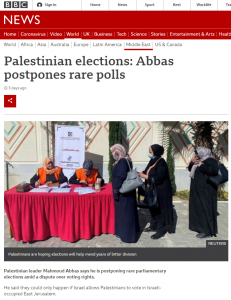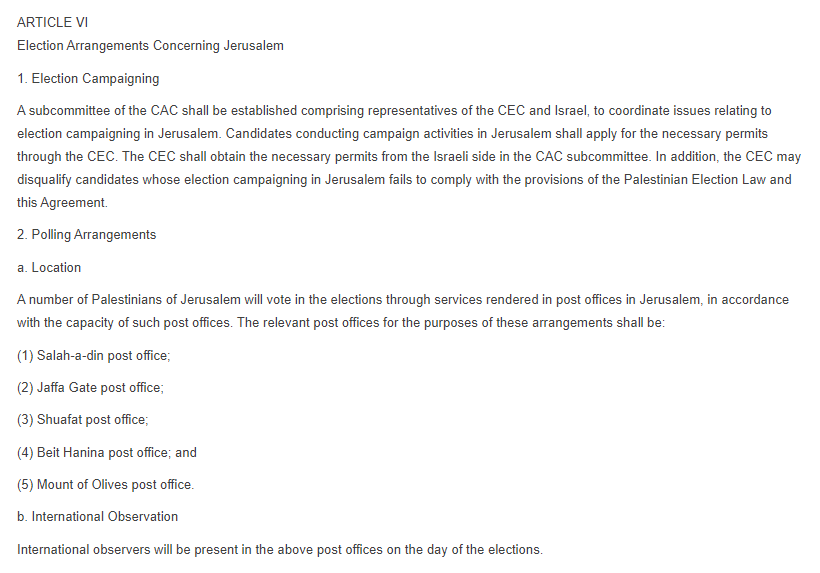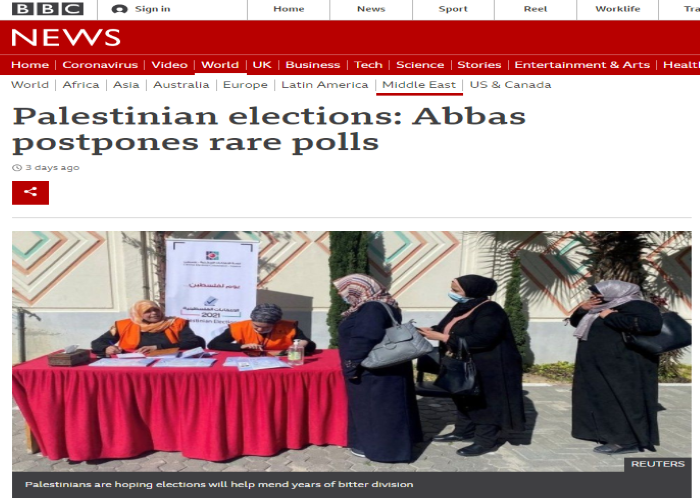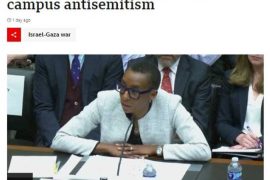As we have previously noted, ever since Mahmoud Abbas’ January 15th presidential decree ordering three rounds of elections, observers have been sceptical about whether they would actually take place.
When the BBC did finally get round to reporting on those elections on April 24th, it was clear that it was aware of the fact that the pretext likely to be used for their cancellation was that of voting in Jerusalem:
“Many analysts suspect he [Abbas] could be looking for a way to backtrack. His officials have been getting more vocal calling on Israel to let Palestinians vote in East Jerusalem. Israel is obliged to do so under the Oslo accords, and in 2006 it allowed voting in a limited number of post offices. But so far this year Israel has remained officially silent about it.
Mr Abbas says failure to let people vote there would provide just grounds – his critics would call it a pretext – to postpone the poll.”
Nevertheless, a BBC News website report published on April 30th – “Palestinian elections: Abbas postpones rare polls” – opened with amplification of that pretext.
“Palestinian leader Mahmoud Abbas says he is postponing rare parliamentary elections amid a dispute over voting rights.
He said they could only happen if Israel allows Palestinians to vote in Israeli-occupied East Jerusalem.
Israel has not made clear whether it will allow this without restrictions.”
Later in the report readers were told that:
“The president blamed the delay on the dispute over Jerusalem after a meeting with Palestinian factions on Thursday.
“Facing this difficult situation, we decided to postpone the date of holding legislative elections until the participation of Jerusalem and its people is guaranteed,” Abbas said in the speech on Palestinian TV.
“Jerusalem will not be compromised, and our people in Jerusalem will not give up their right to exercise their democratic rights.”
The Palestinians have insisted that all 150,000 eligible Palestinian voters in East Jerusalem be allowed to cast their ballots in its suburbs.
However, under a previous agreement with Israel governing Palestinian voting rights in the city, only up to 6,300 could vote there in Israeli-designated post offices. In the last election, the remainder were allowed to cast their vote so long as it was outside the city boundaries.”
That “previous agreement” is the 1995 Israeli-Palestinian Interim Agreement (Oslo II) – specifically Article IV of Annex II – which shows that rather than being “Israeli-designated”, those post offices were in fact specifically named in the agreement signed by the PLO. The number 6,300 does not appear in that agreement.

Notably, the BBC did not clarify to readers that that “previous agreement” related to elections for Palestinian Authority institutions whereas Abbas’ presidential decree ordering elections was issued two days after his initiation of a change to the law “stating that this is no longer an election for the Palestinian Authority but for the State of Palestine, that is, for the President and the Legislative Council of the State of Palestine”.
Neither did the BBC mention the fact that the same action by Abbas repealed a 2007 law stating that candidates in the election must accept the obligations assumed by the PLO under the Oslo Accords.
Like the previous BBC article on this topic, this one too does not inform readers that the PA had previously rejected a proposal for digital voting or that the Palestinian Central Elections Commission had stated ten days previously that it had already made arrangements for Jerusalem residents to vote.
“According to the commission, around 150,000 residents will be able to vote in what Palestinians call the “Jerusalem suburbs” — towns and villages that ring the capital. Israel defines these areas as lying in the West Bank, while the Palestinian Authority see them as part of its “Jerusalem Governorate.”
“The committee has provided eleven polling stations in the suburbs of Jerusalem so that the 150,000 Jerusalemites can vote in them without prior registration, and has trained technical staff to carry out this task,” the commission said in a statement.”
In a sub-section headed “Why is Jerusalem a sticking point?” readers find the BBC’s standard partisan framing of that topic.
“The status of the city goes to the heart of the Israeli-Palestinian conflict, and actions by each side there often have huge political symbolism.
Israel has occupied East Jerusalem since the 1967 Middle East war and regards the entire city its capital, though this is not recognised by the vast majority of the international community. Palestinians claim East Jerusalem as the capital of a future hoped-for state. Israel bans Palestinian political activity there, considering it a violation of Israeli sovereignty.
Almost all the approximately 350,000 Palestinians who live in East Jerusalem have the status of permanent residents of Israel, but (if eligible) vote in Palestinian, not Israeli, elections, unless they have received Israeli citizenship for which they have the right to apply.” [emphasis added]
The BBC did not adequately clarify that in this election, “political activity” would include campaigning by terrorist organisations such as Hamas and the PFLP which do not recognise the Oslo Accords.
The BBC’s report does briefly nod at alternative motivations behind Abbas’ decision to indefinitely postpone the elections.
“It comes as Mr Abbas is facing unprecedented challenges from political rivals which could weaken his party’s chance of success.”
“However, there has been growing speculation that Mr Abbas will call off the elections since popular rivals from within his own party declared they would contest the polls with their own lists.”
Nevertheless, the predominant framing of this BBC report promotes the Mahmoud Abbas narrative whereby Israel is supposedly to blame for the fact that the elections will not take place.
Related Articles:






If it was Israel engaging in this kind of nonsense, we would never hear the end of it.